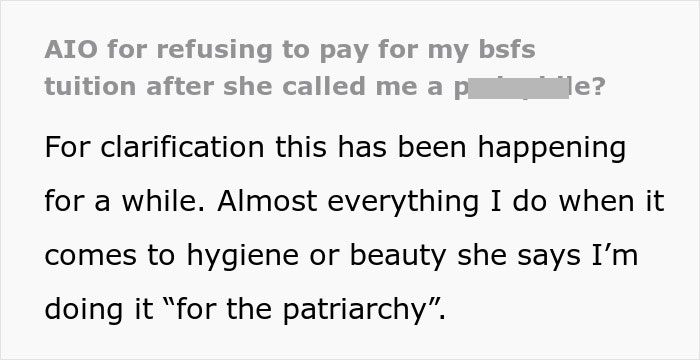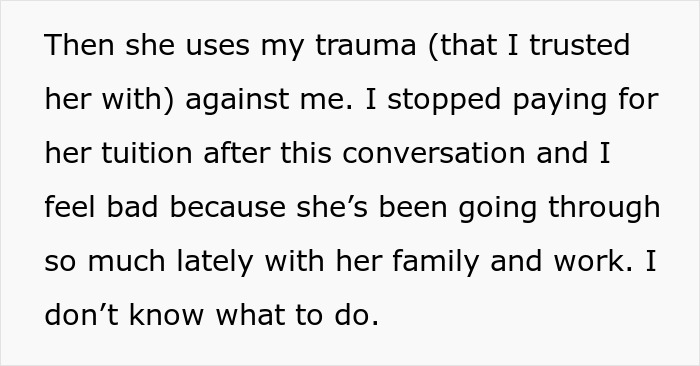Toxic friendships add zero value to anyone’s life. Yet, despite this glaring fact, some people choose to stay in these detrimental relationships, and they have their reasons for doing so.
This woman went so far as to pay for her friend’s school tuition, only to receive serious accusations stemming from her basic hygiene choices. When she decided to cut off the financial support, the friend gaslighted her to make her feel worse.
Ultimately, the woman still feels she was being unreasonable for her decision, as she asks the Reddit community if she had overreacted.
Some people have toxic friends whom they don’t immediately cut off despite the abuse
Image credits: Burdun / Freepik (not the actual photo)
This woman had been putting up with her friend’s judgments about how she takes care of herself
Image credits: hearts4makali
It all came to a head one day when the friend made serious accusations against her
Image credits: benzoix / Freepik (not the actual photo)
She decided to cut off financial support as a response, only to be gaslighted in the end
Image credits: hearts4makali
People stay in toxic friendships because they feel indebted
There are several reasons why people choose to stay in toxic friendships, despite knowing how abusive things can get. However, according to licensed marriage and family therapist Sarah Epstein, LMFT, it revolves around the feeling of being indebted to the other person for what they have done.
In an article for Psychology Today, Epstein stated that the top reason is the deep history shared between friends. As she explained, the mere ability to say “we’ve been friends for 20 years” makes it difficult for people to let go of a friendship, no matter how toxic it can get.
Epstein also pointed out that many people find it easier to hold on to a depleting friendship than to set boundaries. This is particularly true for those who are non-confrontational and would rather keep the status quo than face the discomfort of shifting the dynamics.
People may also keep a toxic friend because of how they were helpful during a difficult time. The author later admitted this in a reply in the comments, stating she was doing it out of care and guilt.
If this is the case, Epstein advises asking an important question: “What do I owe this friend, and for how long?”
A friend who triggers bad vibes isn’t worth keeping around
A clear indication of a toxic friend is the negativity they bring. All of a sudden, a supposedly relaxing night turns sour. For the people dealing with such behavior, it can be draining.
But as licensed psychologist Dr. Suraji Wagage notes, some may tolerate it because they are used to this friendship dynamic.
“You may frequently feel sad, scared, frustrated, or angry, but may push these feelings away because you are accustomed to putting your friend’s needs first,” Dr. Wagage said.
In such situations, most experts advise setting boundaries, such as limiting contact. The author did her part by cutting off financial support, to which her friend responded violently.
Dr. Wagage says this reaction is expected from people who carry these toxic traits. However, she clarifies that, “If this happens, it does not mean you are doing something wrong.”
The author did the right thing by refusing to tolerate the abuse and damaging accusations hurled at her. She is better off distancing herself from a manipulative person she once called a friend.
Commenters didn’t hold back, with some calling out the author for her “doormat behavior”
More readers gave their blunt reactions


















0 Comments